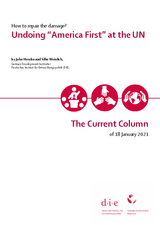How to repair the damage?
Undoing “America First” at the UN
Hendra, John / Silke WeinlichThe Current Column (2021)
German Development Institute / Deutsches Institut für Entwicklungspolitik (DIE), The Current Column of 18 January 2021
Joe Biden will be inaugurated as President of the United States of America on 20 January 2021. He faces high expectations abroad for an end to “America First” – a contempt for multilateralism that translated into the undermining of the United Nations (UN), confrontations with geopolitical rivals, disdain for allies, a refusal to help tackle pressing global problems, but also wide scale, and often wild, unpredictability.
Biden has announced that “America is back”. To repair some of the damage at the UN, Biden already pledged to re-join the Paris climate change agreement and preserve American membership in, and financing to, the World Health Organisation (WHO). He vowed to restore funding to the United Nations Population Fund (UNFPA). Biden also indicated he would sign up to the “30 X 30” pledge to protect 30% of land and ocean by 2030, a key element of the upcoming UN Summit to reverse biodiversity loss. Running for re-election in the UN Human Rights Council as pledged will signal not only renewed global American commitment to human rights at a time of domestic racial unrest. It also means American re-engagement with one of the UN’s most necessary, yet imperfect, institutions given the extraordinary deterioration in respect for human rights in so many places around the globe.
The ongoing pandemic response and recovery work at the UN awaits full US support, be it in the Security Council to take up the security implications of COVID-19 and its multifaceted consequences or through the UN development system which has been providing valuable assistance to many countries’ socio-economic responses. As the Biden Administration puts its highest domestic priority on battling the pandemic in part through accelerated roll-out of vaccines, it will also be critical that it joins the COVAX Facility – the global coalition to make accessible a COVID-19 vaccine for those in greatest need. It remains unclear to date whether there will again be US financial support for the UN Relief and Works Agency for Palestine Refugees (UNRWA), how the new Administration will deal with its extensive accumulated arrears or whether the US will re-join the UN Educational, Scientific and Cultural Organization (UNESCO).
Re-engaging with the UN, however, will require more heavy lifting than many had first predicted. Given the fragile social and democratic fabric in the US, it is not unlikely that the domestic support necessary for a more robust internationalism will prove difficult to achieve, even with a slim majority in Congress. What’s more, the UN that Biden is re-engaging with is not the one he left behind after serving with Obama. Today, China is playing an increasingly assertive role globally and has filled some of the void at the UN. China announced that it will go carbon-neutral by 2060, promises to help many developing countries access the COVID-19 vaccine, and is finding allies at the UN for reinterpretations of human rights and sovereignty, not least Russia, the other traditional US rival at the UN.
The Biden Administration needs to find constructive ways to engage with China on climate change, the pandemic and other issues. At the same time, in order to stand up for human rights and be able to play a leadership role, the US needs to win the trust of other member states, most notably from the Global South. Biden’s choices for UN Ambassador, Linda Thomas-Greenfield, a veteran American diplomat with vast experience in Africa, and for USAID Administrator, former UN Ambassador Samantha Power, both bode well in this regard.
That said, American influence and soft power have waned considerably. Undoubtedly, the 6 January storming of the Capitol, the citadel of American democracy, has made it harder for the new administration to be seen as a global beacon for democracy and the rule of law – and demand special treatment. Immediately overturning the recent incredulous US decision to impose sanctions on two senior officials of the International Criminal Court (ICC) should be a no-brainer, yet the United States’ continued anathema on all sides to becoming a State Party to the ICC to many outsiders smacks of “American exceptionalism” gone awry.
In addition to exercising greater international engagement on human rights and pandemic recovery, the Biden Administration should also look to climate policy as a good place to start reasserting US leadership at the UN. Accelerated development of renewable energy, a net-zero-by-2050 target, a robust domestic climate strategy and an activist climate envoy will not only help the US economy build back greener. It will synergistically help rebuild American credibility in global climate and environment negotiations in the super year 2021. This will hopefully inspire others and allow the world to turn the corner on climate change before it is too late.
John Hendra is a former UN Assistant Secretary-General (with the UNDG, and UN Women) and a former UN Resident Coordinator in Vietnam, Tanzania and Latvia. He continues to provide advice on sustainable development issues and UN Development System reform through his consulting practice and is also currently an Associate Researcher with the German Development Institute / Deutsches Institut für Entwicklungspolitik (DIE).
Silke Weinlich is a senior researcher with the research programme “Inter- and Transnational Cooperation” at the German Development Institute / Deutsches Institut für Entwicklungspolitik (DIE) where she leads a research and policy advice project on the reform of the UN Development System.


